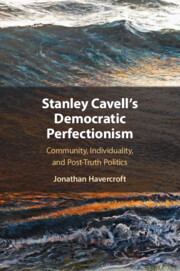Book contents
- Stanley Cavell’s Democratic Perfectionism
- Stanley Cavell’s Democratic Perfectionism
- Copyright page
- Contents
- Acknowledgments
- Abbreviations
- Introduction
- 1 The Claiming of Community
- 2 Stanley Cavell as Methodologist
- 3 Two Kinds of Agreement in Democratic Theory
- 4 The Politics of Tragedy, Recognition, and Acknowledgment
- 5 Film, Gender, Gaslighting
- 6 The Limits of Democratic Perfectionism
- Conclusion
- Bibliography
- Index
3 - Two Kinds of Agreement in Democratic Theory
Published online by Cambridge University Press: 17 August 2023
- Stanley Cavell’s Democratic Perfectionism
- Stanley Cavell’s Democratic Perfectionism
- Copyright page
- Contents
- Acknowledgments
- Abbreviations
- Introduction
- 1 The Claiming of Community
- 2 Stanley Cavell as Methodologist
- 3 Two Kinds of Agreement in Democratic Theory
- 4 The Politics of Tragedy, Recognition, and Acknowledgment
- 5 Film, Gender, Gaslighting
- 6 The Limits of Democratic Perfectionism
- Conclusion
- Bibliography
- Index
Summary
The third chapter draws upon the procedures of ordinary language philosophy discussed in Chapter 2 to offer a critique of contemporary democratic theory. A significant point of contention between deliberative and agonistic democratic theorists is over the purpose of political argumentation. While deliberative democrats maintain that the goal of political debate is to reach agreement, many agonistic democratic theorists claim that arguments can foster relations of adversarial respect. This chapter demonstrates how the deliberative versus agonistic democracy debate is operating at cross-purposes. Behind this debate is the skeptical concern that if political argumentation cannot come to an agreement, then the enterprise is either irrational or prone to relativism. Drawing upon Cavell’s insight that human understanding rests upon agreement in forms of life, I examine how democratic discourse involves agreements at two levels: at the level of opinions and at the level of the discourse itself. This chapter clarifies what is at stake in the deliberative-agonistic democratic theory debate. Cavell helps us reimagine democracy by fostering a culture in which minority communities do not have to phrase their grievances within the language of hegemonic cultures.
- Type
- Chapter
- Information
- Stanley Cavell's Democratic PerfectionismCommunity, Individuality, and Post-Truth Politics, pp. 98 - 131Publisher: Cambridge University PressPrint publication year: 2023

